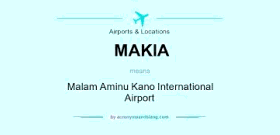 MAKIA Soars: Revenue Up 20%, New Hotel & Runway Planned
MAKIA Soars: Revenue Up 20%, New Hotel & Runway Planned
Malam Aminu Kano International Airport (MAKIA) is undergoing a major transformation, marked by significant revenue growth and ambitious expansion plans. This presents exciting new opportunities for African travel agents seeking to capitalize on Nigeria's burgeoning travel market.
In a recent briefing, Airport Manager Comrade Ahmed Danjuma highlighted MAKIA's impressive financial performance. The airport exceeded its 2024 revenue target of N17.3 billion by over 20%, generating N20.83 billion. This success underscores the airport's strategic importance and its potential for further growth.
This financial strength fuels ambitious development plans. A key initiative is the construction of a new hotel within the domestic terminal complex. This development aligns with broader trends in African airport development, mirroring successful projects at major hubs like Addis Ababa and Johannesburg. The hotel will cater to both business and leisure travelers, enhancing the airport's appeal and generating valuable non-aeronautical revenue.
Further enhancing MAKIA's infrastructure is the planned resurfacing of the airport's runway. This crucial upgrade, overdue since 2011, will improve operational safety and efficiency, attracting more airlines and boosting connectivity. The ongoing renovation of the Dankabo domestic terminal, expected to be completed within the next few months, will further modernize the airport's facilities and enhance the passenger experience.
While the older international terminal currently serves domestic flights, MAKIA is actively addressing maintenance challenges. Re-roofing and cooling system upgrades are underway to ensure passenger comfort during the transition period. This proactive approach demonstrates the airport's commitment to providing a positive travel experience despite ongoing renovations.
MAKIA's strategic location in the heart of Kano city offers significant advantages for commercial development. The airport management is actively engaging with local businesses and investors to maximize non-aeronautical revenue opportunities. Plans include reactivating a private lounge, developing land for car parks and shops, and expanding retail concessions. These initiatives align with global best practices for airport revenue diversification, reducing reliance on passenger fees and creating a more vibrant airport ecosystem.
MAKIA's operational metrics reveal a dynamic and growing airport. In April, the airport handled over 67,000 passengers, with domestic traffic accounting for 62% of the total. This strong domestic demand underscores the importance of regional connectivity within Nigeria. The airport also processed substantial cargo volumes, handling over 16,000 tons of domestic cargo and nearly 950,000 units of international cargo.
The airport's workforce of 1,255 personnel supports these operations, maintaining a staff-to-passenger ratio comparable to other busy African airports. To address the high cost of ground transportation, MAKIA is introducing a dedicated staff shuttle bus and encouraging more private operators to offer competitive shuttle services for passengers. This initiative aims to improve accessibility and affordability for all airport users.
MAKIA's success story reflects a broader trend of growth and modernization within the African aviation sector. While West Africa faces challenges related to aging infrastructure and operational inefficiencies, airports like MAKIA are demonstrating proactive leadership in driving improvements and attracting investment. The airport's focus on non-aeronautical revenue, infrastructure upgrades, and stakeholder engagement positions it as a key player in Nigeria's aviation future.
For African travel agents, MAKIA's transformation presents significant opportunities. The airport's expanding capacity, improved facilities, and growing connectivity create new possibilities for travel itineraries and business partnerships. By staying informed about MAKIA's developments and engaging with the airport management, travel agents can leverage these opportunities to enhance their service offerings and tap into Nigeria's dynamic travel market.
MAKIA's commitment to modernization and revenue diversification sets a positive example for other airports in the region. By embracing innovation and prioritizing passenger experience, MAKIA is not only enhancing its own operations but also contributing to the overall growth and development of the West African aviation sector.
